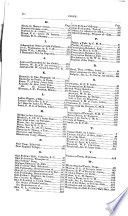 | Adam Smith (économiste) - 1761 - 458 pages
...grow up to manhood in fome folitary place without any communication with his own Ipecies, he could no more think of his own character, of the propriety or demerit of his pwn fentiments and conduit, of the beauty or deformity of his own mind, than of the jseauty or deformity... | |
 | Adam Smith - Ethics - 1767 - 504 pages
...grow up to manhood in fome folitary place without any communication with his own fpecies, he could no more think of his own character, of the propriety or demerit of his own fentiments and conduct, of the beauty or deformity of his own mind, than of the beauty or deformity... | |
 | Adam Smith - Conduct of life - 1767 - 498 pages
...grow up to manhood in fome folitary place without any communication with his own fpecies, he could no more think of his own character, of the propriety or demerit of his own fentiments and conduct, of the beauty or deformity ^of his own ,mind, than of the beauty or deformity... | |
 | Adam Smith - Ethics - 1793 - 350 pages
...grow up to manhood in fome folitary place, without any communication with his own fpecie*^ he could ho more think of his own character, of the propriety or demerit of his own fentiments and conduct", .of the beauty or deformity of his own jnind , than of the beauty or deformity... | |
 | Sir Richard Joseph Sullivan (bart.) - Philosophy - 1794 - 540 pages
...colours are to be distinguished by the blind ? Were it possible that a human creature could grow np to manhood, in some solitary place, without any communication with his own species, I allow he could no more think of his own character, of the propriety or demerit of his own sentiments... | |
 | Adam Smith - Economics - 1812 - 642 pages
...grow up to manhood in fome iblitary place, without any communication with his own fpecies, he could no more think of his own character, of the propriety or demerit of his own fentiments and conduct, of the beauty or deformity of his own mind, than of the beauty or deformity... | |
 | Adam Smith - Ethics - 1817 - 776 pages
...supposed equitable judge. If otherwise, we enter into his disapprobation, and condemn it. Were it possible that a human creature could grow up to manhood in...without any communication with his own species, he could no more think of his own character, of the propriety or demerit of his own sentiments and conduct,... | |
 | Rev. Latham Wainewright - Ethics - 1830 - 358 pages
..." Were it possible," observes Dr. Adam Smith, who was decidedly opposed to the theory of utility, " that a human creature could grow up to manhood in...species, he would no more think of his own character, of relating to him the same historical facts, is a very distinct question, and one respecting which Paley... | |
 | Rev. Latham Wainewright - Ethics - 1830 - 250 pages
...Were it possible," observes Dr. Adam Smith, who •was decidedly opposed to the theory of utility, " that a human creature could grow up to manhood in...communication with his own species, he would no more tlunk of his own character, of relating to him the same historical facts, is a very distinct question,... | |
 | 1843 - 604 pages
...great degree subvert his enmities, and check the grosser feelings of his nature." Were it possible that a human creature could grow up to manhood in some solitary place, without any communication whatever with his species, he would be as devoid of moral feelings, and as dissocial in his nature,... | |
| |